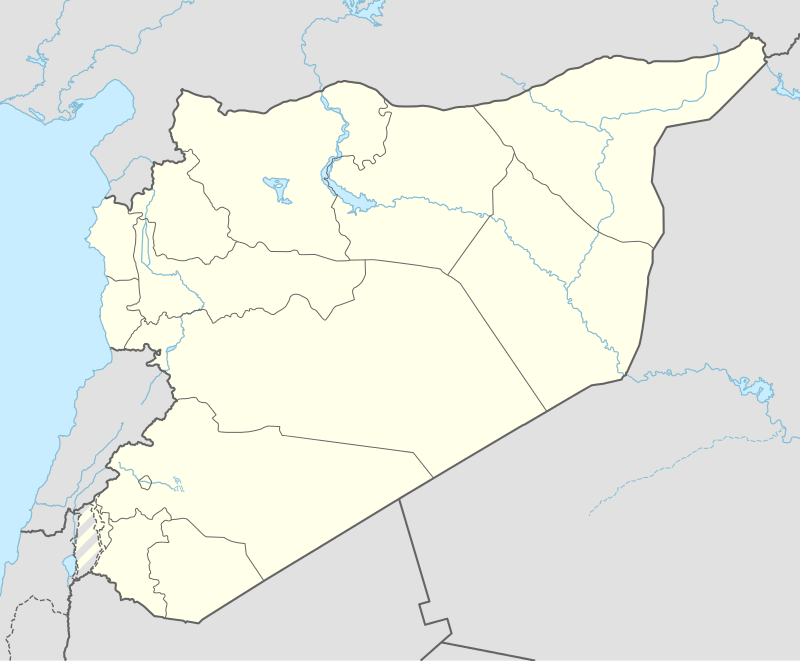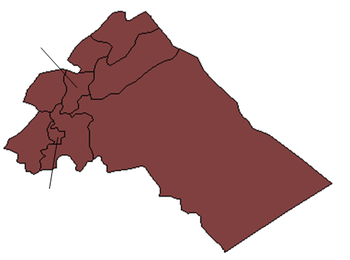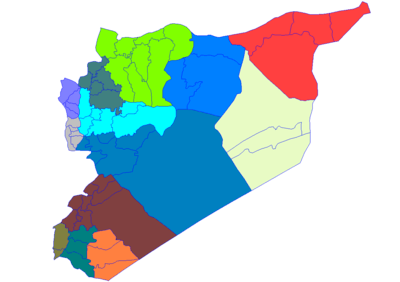Madaya, Syria
Madaya (Arabic: مضايا) is a small mountainous town in Syria, located at an altitude of around 1,300 metres (4,300 ft).[2] It is located about 40 kilometres (25 mi) northwest of Damascus in the Rif Dimashq Governorate and is home to Lake Barada, although this must be a metaphorical reference because there doesn't seem to be a lake anywhere nearby. According to locals in the area Lake Barada used to be bigger but due to pollution and industrial causes it has shrunk. Madaya often is snow-top during the winter months especially on January and February. According to the Syria Central Bureau of Statistics (CBS), Madaya had a population of 9,371 in the 2004 census.[1] Its inhabitants are predominantly Sunni Muslims.[3] Madaya is home to a large illegal market home to foreign brands that are smuggled in from Lebanon's Chtaura, which is close to the area.
Madaya مضايا | |
|---|---|
Town | |
 Madaya Location in Syria | |
| Coordinates: 33°41′16″N 36°06′3″E | |
| Country | |
| Governorate | Rif Dimashq |
| District | al-Zabadani |
| Subdistrict | Madaya |
| Elevation | 1,344 m (4,409 ft) |
| Population (2004 census)[1] | |
| • Total | 9,371 |
History
Syrian civil war
Since July 2015, the town has been besieged by a combination of Syrian forces loyal to the Syrian president Bashar al-Assad and the allied Lebanese militia Hezbollah.[4] In December 2015, Doctors Without Borders reported that 23 people had died of starvation[5] after a total blockade prevented any food or humanitarian aid to enter since 18 October.[5] United Nations Secretary General Ban Ki-Moon expressed alarm at the situation in Madaya[6] as well as in other besieged areas in Syria, and warned that the use of starvation as weapon during conflict is a war crime.
On 7 January 2016, the UN Office for the Coordination of Humanitarian Affairs issued a statement[7] calling for unimpeded access to deliver emergency assistance to Madaya, Al-Fu'ah and Kafriya. Amid calls from United Nations officials[8] and dozens of humanitarian organizations[9] to intervene, the United Nations negotiated a deal between the Syrian government and rebels holding the town to allow for the delivery of humanitarian aid, which was carried out on 11 January 2016.[10]
On 14 April 2017, the 2015 Zabadani cease-fire agreement was implemented, and 60 buses transported 2,350 people, including 400 rebels, from Madaya and Zabadani to Idlib.[11].
References
- General Census of Population and Housing 2004. Syria Central Bureau of Statistics (CBS). Rif Dimashq Governorate. (in Arabic)
- "Madaya, Syria Page".
- Robinson and Smith, 1841, vol 3, 2nd appendix, p. 146
- Khushbu Shah, Nick Paton Walsh and Peter Wilkinson, CNN (7 January 2016). "Madaya: Syria allows aid into besieged city - CNN.com". CNN.CS1 maint: multiple names: authors list (link)
- "Siege and starvation in Madaya; immediate medical evacuations and medical resupply essential to save lives". Médecins Sans Frontières (MSF) International. Retrieved 2016-01-14.
- Rivett-Carnac, Mark. "U.N. Chief Warns Syria Starvation Is a War Crime". TIME.com. Retrieved 2016-01-23.
- Section, United Nations News Service (2016-01-07). "UN News - UN calls for humanitarian access to besieged areas in Syria, welcomes new approvals from Government". UN News Service Section. Retrieved 2016-01-14.
- "Assistant Secretary-General for Humanitarian Affairs and Deputy Emergency Relief Coordinator, Kyung-Wha Kang Security Council Briefing on Syria, New York, 15 January 2016". ReliefWeb. Retrieved 2016-01-23.
- "Joint statement: An appeal to end the suffering in Syria [EN/AR/FR/SP/RU/CH]". ReliefWeb. Retrieved 2016-01-23.
- Kareem Shaheen (11 January 2016). "Trucks from aid convoy enter besieged Syrian town of Madaya". The Guardian. Retrieved 11 January 2016.
- Nabih Boulos (14 April 2017). "Syrians leave family, memories behind as tens of thousands are evacuated in previously brokered deal". Los Angeles Times.

